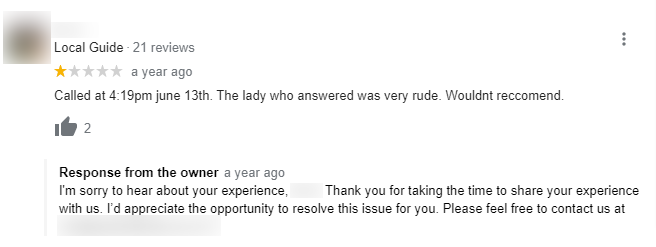🔥 Whitespark's Local Ranking Grids are coming soon! Get notified when we launch
🔥 Whitespark's Local Ranking Grids are coming soon! Get notified when we launch

Update: August 24, 2021
After this article was posted we were asked a very interesting question that we would like to dive into a little deeper – should you use a reviewers name at all in a review? Does it infringe on a reviewers HIPAA rights? Find out more.When your business operates in a sensitive or highly regulated industry (legal, health care, mental health) what’s the best way to approach responding to reviews? How can these businesses respond to reviews that deal with delicate subjects while honouring confidentiality?
In these industries, practitioners are often hesitant to respond to reviews and seek direction on how to engage. Many don’t want to ask for reviews or respond to them.
Creating a reputation management strategy is critical for all businesses but requires special attention when operating in a highly regulated industry. It’s essential to connect with each client’s review and open the doors of communication.
Google strongly recommends responding to your reviews. According to Google My Business’s guidelines,
“When you reply to reviews, it shows that you value your customers and their feedback”.
Replying to reviews is essential to building trust and creating high-quality leads for your business. Your client is investing the time to share their feedback and tell you where you are winning and potentially where you’re losing – this is invaluable information that can contribute to your business’s success! 
When you respond to reviews, it encourages more clients to leave high-quality reviews on your listing, which, “[…] can improve your business visibility and increase the likelihood that a shopper will visit your location”. Having many high quality review responses shows people that you engage, listen, and value your clientele.
Ultimately, this leads to more clients wanting to express their experience as they can count on your business to acknowledge and use their feedback to improve future interactions. In the end, everyone wants to be heard and acknowledged and that is what drives a customer to leave a review.
When you respond to reviews it helps you establish trust with customers and prospects, as well as Google. In the past couple years, review spam in local search has been rampant, making it essential to signal to Google that your business is legitimate and trustworthy.
While receiving reviews helps inform Google that searchers are interacting with your business, responding to reviews shows Google you are engaging with customers through your listing. Increased engagement can positively impact your rankings, leading to more searchers and potentially new clients.
Review content helps build relevance in local search and when you respond to reviews, you show people that your business cares and you help increase engagement on your listing, which can positively impact your ranking, and drive more conversions. 
A recent study showed that 33% of customers who received a response and had their needs met changed the star rating of their review. In addition, 34% of reviewers who left a negative review, once responded to, deleted the original review. There is a huge opportunity here to keep your star rating up and your customers happy!  Put your Google review responses in trusted and experienced hands with our GMB Management Service. Our team has worked across sensitive and highly regulated industries to deliver high performing, respectful, and confidential review response. Plus they will fully manage your listing.
Put your Google review responses in trusted and experienced hands with our GMB Management Service. Our team has worked across sensitive and highly regulated industries to deliver high performing, respectful, and confidential review response. Plus they will fully manage your listing.
Based on the findings from our 2020 GMB Feature Adoption study, we found that these businesses are the most likely to have 0 reviews.
As you may have guessed, all of these businesses have industry governance that can limit their ability to engage in review acquisition or may work in areas consumers aren’t comfortable reviewing.
This emphasizes why, when responding to positive reviews, businesses should keep it short and to the point. In highly regulated industries, you want to avoid adding any personal details about their service to protect privacy and confidentiality. We recommend thanking them directly for leaving the review and if appropriate letting them know the best ways to stay in touch (ie. subscribe to your newsletter or blog). or simply saying you are always there to help.
Here are some examples of review templates you can use when responding to positive reviews:

Though negative reviews seem like a landmine field to navigate, there is no need to panic. Google states that “Negative reviews aren’t necessarily a sign of bad business practices.” Oftentimes, a reviewer could have mismatched expectations or there is a simple solution to changing how they feel about their experience. People write reviews to be heard by the business and to ignore a negative review would be a missed opportunity.
When responding to negative reviews in an industry that protects client confidentiality and privacy, we recommend responding in a way to discuss the situation “behind closed doors”. Providing a client with an email address is a great way to facilitate a conversation where you can give them undivided attention away from the public. There you can discuss details and really get to the bottom of the problem.
Examples of how to address a negative review:
 For lawyers the American Bar Association (ABA) suggests that:
For lawyers the American Bar Association (ABA) suggests that:
“If a lawyer chooses to respond publicly, permissible responses could include posting an invitation to contact the lawyer privately to resolve the matter or indicating that professional considerations preclude an online response.”
The bottom line is that it’s important to resolve your client’s issue – not only for managing your business’s online reputation – but also to show others that their feedback is being considered and addressed. Never miss a review response again with the help of our GMB Management Service. Our experts have extensive experience working in sensitive and highly regulated industries. You can count on respectful, thoughtful, and timely review responses.
After this article was posted we were asked a very interesting question that we would like to dive into a little deeper – should you use a reviewers name at all in a review? Does it infringe on a reviewers HIPAA rights?==Short answer: Not exactly.
It is a actually a HIPAA myth to not use a patient’s name. However, there is some nuance to consider. According to the HIPAA certified Qminder,
“Displaying names, especially when it’s limited to first names and/or initials, does not breach the Privacy Rule”.
However, there is no harm in not addressing a reviewer by their name. If your business operates under HIPAA, it is perfectly okay to omit a reviewer’s name to stay on the safe side. In the end, it is important to respond to each review for the reasons outlined by this article – when in doubt, keep it simple!
*DISCLAIMER: Please note that I am not a certified HIPAA specialist. Please seek professional help when navigating patient confidentiality and HIPAA law in your country.
If you are a sensitive industry, having internal policies in place is essential for conducting client relations. When it comes to reviews, make sure your client-facing employees such as receptionists, assistants, client care associates, and any other employees who communicate with clients are aware of your review responding policies.
Responding to reviews in highly regulated industries can be challenging but not impossible to navigate. If you arm your business with a solid review response strategy, even a negative review isn’t always a negative. Responding to reviews leads to conversions and indirect rankings. By staying up to date with your review responses, you are acknowledging a customer’s thoughts by showing you’re listening. Build a better business by being engaged, understanding your clients’ needs, and creating a positive feedback environment.
Do you have any suggestions for a winning review response strategy for regulated industries with client confidentiality? We would love to hear your thoughts below.